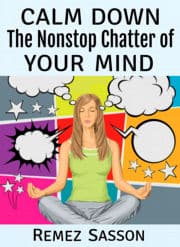
- How to reduce anxiety and stress?
- What type of meditation reduces stress?
- What are simple ways to reduce stress?
These are valid questions many people ask.
Everyone experiences stress from time to time. Stress is a normal reaction to pressure and external factors, but if your stress begins to build up, it can negatively impact your life.
A practical guide to transforming your mindset and visualizing a better life — from the inside out.
Intro Price: $9.99 » Discover the Guide
Constant stress has been shown to weaken your immune system, increase your risk of mental illness, and lower your performance at work.
Stress is inevitable, but that doesn’t mean you can’t do anything about it.
If you are ready to start reducing the harmful effects of constant stress, read on. This article provides tips on beginning a meditation practice to help you reduce stress and relax as much as possible.
You will learn how to use meditation for stress reduction.
What Is Stress and Why Is It Harmful?
When we are under stress, we may be worried about work deadlines, a family issue, the state of the world around us, our own health issues, or any other source of pressure.
Our bodies react to stress in different ways, but the common effect is an increase in heart rate, blood pressure, and cortisol levels in the body.
When we are stressed, we are more likely to think in “hyperarousal” mode. We become more anxious and more likely to make rash decisions.
Meditation has been shown to decrease cortisol levels while increasing dopamine, serotonin, and gamma-aminobutyric acid (GABA) levels in the brain. This leads to a calmer and more focused state of mind.
When we meditate, we breathe more regularly and deeply, the muscles in our body relax, and we can perform at a higher level without becoming exhausted so quickly.
Benefits of Meditation for Stress Relief
Here are a few of the benefits of meditation for stress reduction and its effects on the body, mind, and emotions.
- A calming effect on the brain
- Improved regulation of blood pressure
- Calmness and relaxation
- Better concentration and focus
- Better sleep
- Increased resilience to stress
- Reduced feelings of social anxiety
- Better understanding of your emotions
- Increased self-esteem
- Greater mental strength
- Better physical health
- Better mood
Meditation, Relaxation and Stress Reduction
Meditation teaches you to pay attention to your thoughts and feelings while remaining calm and focused.
You are learning to control your thoughts and feelings so that they don’t control you. This can be extremely helpful in reducing the harmful effects of stress.
Can meditation reduce stress? Yes, it can!!
Practicing meditation regularly can also improve your sleep and ability to relax.
Meditation has been shown to decrease insomnia symptoms, and improve sleep quality.
People who practice meditation regularly report feeling calmer, less anxious, and less self-conscious. This makes social situations easier and less stressful.
There are many benefits to practicing meditation, but the most important is the relaxation that it brings to your body and mind. Relaxation is the key to reducing your stress levels and having a better quality of life.

Quiet the Mental Noise and Find Your Inner Calm
Learn how to calm your racing thoughts, find peace, and take control of your mental world. This book is your step-by-step guide to inner peace, clarity, and mental mastery.
Calm Down the Nonstop Chatter of Your Mind” Now »
If you are able to achieve a good level of relaxation, you will be able to better focus on your daily tasks and experiences without feeling overwhelmed or rushed.
Many people who are looking for ways to reduce their stress may be looking for the quickest way possible. While meditation may not have the instant results that some other methods may have, it does have an incredible long-term impact on you and your life.
How to Start Meditating for Stress Reduction
If you are interested in starting a meditation practice, there a few things you should keep in mind.
First, you don’t have to do anything special. You can meditate while sitting on a chair, sitting on a cushion, or sitting on the floor crossed legged, if you find this position comfortable.
Lying down is not recommended as you might fall sleep.
The quieter and more relaxing atmosphere you create the better.
Make sure you have meditation set up where you cannot be disturbed and that you can sit still and calm enough to reap all of the benefits of this practice.
Choose a Quiet Place
Choose a quiet place for your meditation. You do not want to be disturbed while meditating by people intruding your privacy, loud noises or the phone ringing.
Early morning, or some time in the evening can be good times. If you can find the time, it would be a good idea meditate twice a day. The morning meditation would give you the calmness you need to deal with stress during the day, and the evening meditation would help you unwind and relieve the stress of the day.
Types of Meditations
There are many meditation techniques, but you need to choose one, a simple one.
You need something that helps you focus your mins and relax.
Here are a few simple, basic meditations to choose from.
Focusing on Your Breath
This is the simplest and most common meditation that most people start with.
After sitting down comfortably, start breathing in and out slowly and calmly, while focusing your attention on your breath.
That’s all you need to do. If your attention goes somewhere else, just gently bring it back to your breathing.
Start with 5 minutes, and later, after becoming accustomed to this kind of meditation, increase the time to 10 minutes. There no need to meditate more than 10 minutes.
Music Meditation
Some people are inspired by soft relaxing music.
Sit down, and play some relaxing music. It doesn’t have to be new-age music. It can be orchestra or concert music, just a guitar, or any other kind of calming music that you like.
Focus you attention on the music, letting yourself dive and soak in the music, forgetting everything else.
If your mind goes somewhere else, bring it back to the music.
Music meditation can have a great impact on the mind, emotions and body, relaxing them, and making them immune to stress.
Candle Meditation
Candle meditation is a simple meditation technique. In this meditation, you focus your sight and your attention on the flame of a candle for a certain length of time.
Position the candle on a table or the floor at about 50 centimeters from you.
Focus your attention on the flame of the candle. This is all what you need to do. Just look at the flame as it flickers and changes shape and color.
Try to hold your sight and attention solely on the flame of the candle, without thinking of anything else or looking at anything else in the room. Just immerse your complete attention in the flame of the candle.
For more details and guidance read our article on candle meditation.
Mantra Meditation
This is a simple, but most powerful meditation.
In the East, a mantra is considered as a sacred utterance, word or group of words believed to have psychological and spiritual powers. Repeating it can induce an altered state of consciousness.
Focusing on a mantra, teaches your mind to focus on one word or sound, and to disregard other thoughts that try to attract its attention.
This action calms down the nonstop chatter and restlessness of the mind.
All you need to do is clear your mind of everything, and then start repeating your mantra, aloud or mentally, at a moderate speed.
I don’t want to go deeply into this meditation, since I have written complete instructions on how to practice mantra meditation.
For various forms of meditation read the article 6 Meditation Techniques that Will Calm Your Mind.
Online Meditation Course: The Path to Awakening
Meditation techniques with guidance for finding inner peace, expanding consciousness, and awakening.
Conclusion
Stress is a normal reaction to pressure and external factors. However, constant stress has been shown to weaken your immune system, increase your risk of mental illness, and lower your performance at work.
The good news is that stress is something you can have control over. With the right techniques and strategies, you can lower your stress levels and improve your quality of life. Meditation is one of the best ways to reduce stress and relax at the same time.
It allows you to take a break from the outside world for a few minutes, focusing instead on what matters most to you.
Meditation for stress reduction teaches you to pay attention to your thoughts and feelings while remaining calm and focused. This can help reduce the harmful effects of stress and increase your resilience to stress.

Quiet the Mental Noise and Find Your Inner Calm
Learn how to calm your racing thoughts, find peace, and take control of your mental world. This book is your step-by-step guide to inner peace, clarity, and mental mastery.
Calm Down the Nonstop Chatter of Your Mind” Now »
Our inspiring online courses and eBooks help you go beyond words, into clarity, calm, focus, inner strength, success, and real personal growth.

